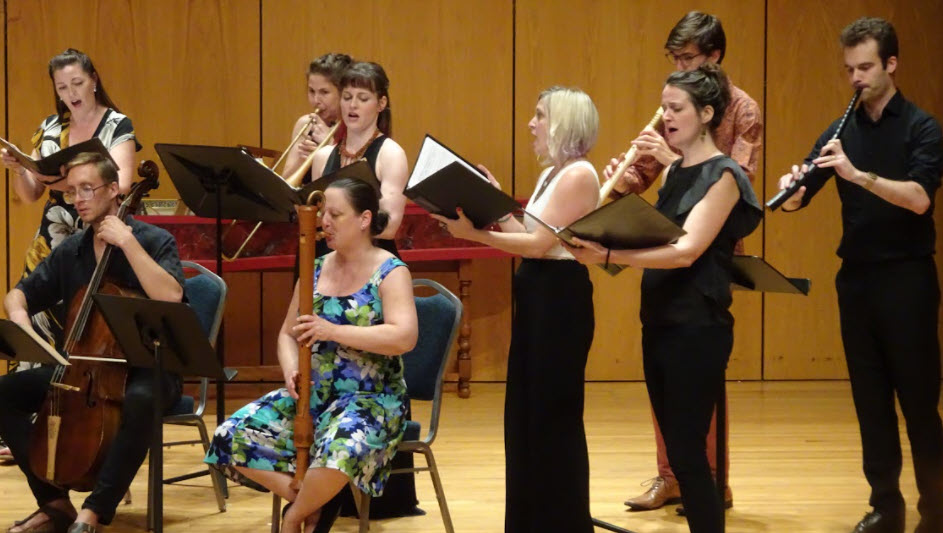
Once the sweet showers of April had arrived in 14th-century England, Geoffrey Chaucer’s pious pilgrims began packing for a road trip to Canterbury. In springtime six centuries later, aficionados of early music and period instruments in the U.S. start thinking about attending inspirational summer programs. Many of those will decide either to sign on for Amherst Early Music, where they might well be performing music from Chaucer’s time, or for the Oberlin Baroque Performance Institute—two essentially similar programs that serve a range of abilities and interests, and both of which got their start half a century ago.
The Oberlin program can point to the more precise launch date: June 1972, when 56 students from 22 states, most of them viol players, gathered at the conservatory in Ohio for a two-week session organized by oboist James Caldwell and cellist Catharina Meints and directed—for what would be the institute’s first 18 seasons—by Swiss viol player August Wenziger.
Caldwell had met Meints, his future wife, while playing in the Chamber Orchestra of Philadelphia at a time when he became fascinated with the viol and had acquired five of them in hopes of playing with friends. His enthusiasm rubbed off on Meints, who would pursue parallel career tracks as a cellist in the Cleveland Orchestra and cello and gamba professor at Oberlin. Together, they amassed an impressive collection of period instruments before Caldwell’s death in 2006.
The Amherst festival had a longer and more complicated gestation. It traces its origin in the 1920s to a music camp in Interlochen, MI, where workshops sponsored by the American Recorder Society with ex-jazz player LaNoue Davenport were added in 1961, followed by instruction in viol, baroque flute, and krummhorn in 1962.
More period instruments were gradually included as the festival moved to other locations—Goddard College in Vermont, featuring recorder virtuoso Bernard Kranis, then to Hampshire College, the University of Connecticut in Storrs, Tufts University, and Bennington College—and finally settled at Connecticut College in New London while retaining Amherst in its name. (Due to construction at Connecticut College, the 2022 Amherst festival will be held Aug. 7-21 at Northampton Community College in Bethlehem, PA.) Meanwhile, Oberlin’s program stayed put among the cornfields of Northeast Ohio, although in the beginning, Caldwell and Meints considered omitting Oberlin from its name, just in case things didn’t work out with the Conservatory. Five decades down the road, Oberlin BPI was getting ready to celebrate its 50th anniversary when the pandemic arrived in 2020 with its own agenda, forcing both the Oberlin and Amherst programs to move online.
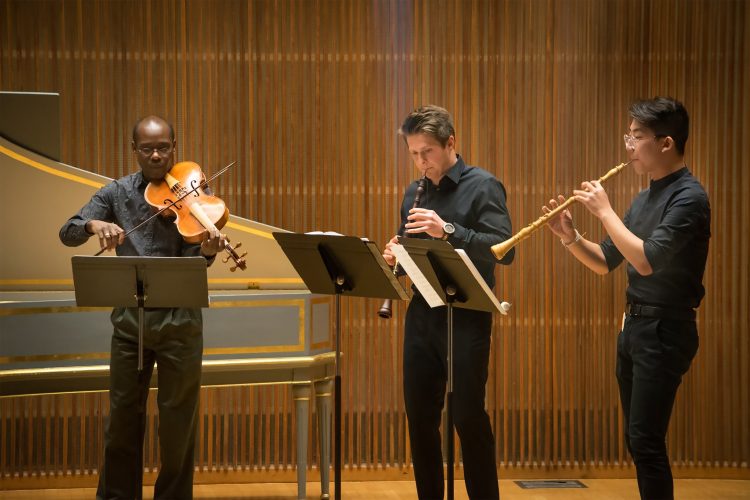
This hiatus in live participation provides an opportunity to re-examine one of the founding objectives unique to these two long-lived programs: to bring together amateur and professional musicians for the study and performance of early music, and to engage both groups at very high levels.
As Meints writes in her 2018 eBook, Oberlin Baroque Performance Institute, “In our first year we had 56 participants ranging in age from 17 to 65 … Many were in their mid-twenties and another group was over 45. That has remained the typical population over the years. We have offered high school scholarships and have always had a few younger students who then come to Oberlin Conservatory for undergraduate study. We have welcomed many who are just starting their professional careers and are adding to their qualifications, and we have a wonderful group of non-professionals, especially retired people who want to spend their free time working very hard at something they love.”
In his blog entry, “Amherst Early Music Festival: Inclusive and Enlightening,” Keith Powers quotes the Amherst festival’s Frances Blaker about the nature of their participants: We have some very accomplished pre-professionals who come to study, but we also have adult amateurs, some of whom are also quite accomplished. And some who are newer. It’s my aim to make all those people feel welcome.
“The fascinating thing is that we have such a broad range—teenagers to the early 90s,” said Marilyn Boneau, who started teaching Renaissance reed instruments at the Amherst festival in 1984 and became its executive director in 1999. “We’re trying to keep this as a big tent, with an international feel.”
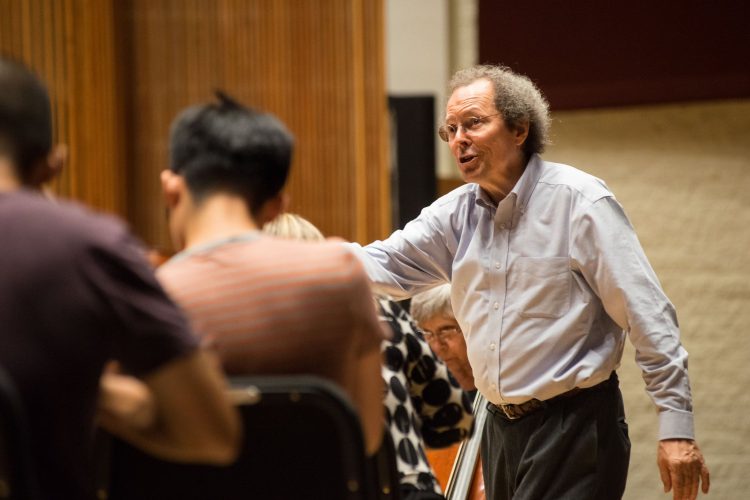
Oberlin BPI director Kenneth Slowik confirms that the notion of combining amateurs and professionals was a “foundational” principle for the Ohio program. “If you think back 50 years, and I don’t want to sound uncharitable, the level of playing wasn’t what it was even in the last 30 years,” he said. “There were a number of amateur players from the Recorder Society and the Gamba Society, some of whom came many years running. A lot of us were just a few years behind Jim and Cathy Caldwell and eager to learn, so there was already a dichotomy between people for whom this was kind of an extension of the Gamba Conclave and those of us who were on a professional track early in our careers. But we were determined at the very beginning that there would be no auditions. And we have never had auditions.”
In her 2018 memoir, Meints expanded on Oberlin BPI’s philosophy of ignoring age and professional status in assigning performing groups which are at the core of the summer program: “We form ensembles based on experience with playing Baroque music, so some of the ensembles have had a 16-year-old violinist, a 40- year-old professional flutist, a 22-year-old conservatory cellist, and a 70-year-old piano teacher—all new at playing their Baroque instrument.”
‘I Can’t Remember Where to Put My Fingers’
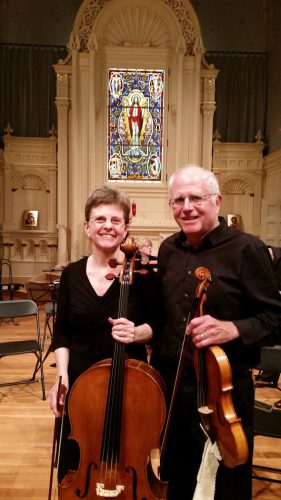
This commingling of different ages and professional standing can create interesting results, as retired Oberlin English professor Nicholas Jones wrote in a “Report from the Road” article on ClevelandClassical.com after attending the Amherst program one summer: Amateurs, semi-professional, and full-time concert artists eat, live, and play together for days on end: what better way to develop ongoing audiences and to ensure the livelihood of those who make music?
At Amherst, in up to four groups a day, we students sang and played our hearts out. Recorder, harpsichord, gamba, baroque violin, and dulcian were a few of the astounding variety of shapes, techniques, and sounds that startled and delighted our collective ears. The faculty included some of the most prominent names in early music: groups such as the women’s vocal quartet Anonymous 4 and the Flanders Recorder Quartet, as well as individual masters of the complex and vast field of early music—just one example is the elegant Baroque soprano Julianne Baird.
Hearing their varied and energetic programs, one could imagine that each of the faculty had brought a suitcase full of favorite pieces—and we all were the beneficiaries of their enthusiasm and skill. One moment we’d hear a lilting, courtly sonata for recorder and violin by Boismortier; and then, perhaps immediately afterward, Josquin’s profound memorial to his teacher, Ockeghem. A production of Rameau’s Les Indes Galantes (worked up in a single week!) featured some astounding playing and singing, almost entirely by students at the festival. When I hear a professional performance of, say, a chaconne by Lully when that morning I myself have been learning how to play a similar piece, I listen with new appreciation and joy. Attending a concert becomes in itself an act of participation, not mere passivity.
Closer to home, Jones, who plays violin, recorder, and viols, and his wife Sue, a cellist and viola da gamba player, have also participated in the Oberlin BPI. In a recent Zoom interview from their new home in Berkeley, CA, they compared their Amherst and Oberlin experiences.
The Joneses had run their own summer music camp, but after they decided to sell it, they became enthusiastic music campers themselves. “We attended BPI or Amherst—usually both—in 2012, 2013, 2015, and 2016,” Sue said, recalling that in her first voice class at BPI, everybody had to sing a solo for the teachers. “They were very kind,” she added.
Nick picked up on the kindness he experienced from the faculty, “a quality stimulated in large part by Cathy Meints. ‘Kindness’ may be too
sentimental a term, but it describes the faculty’s willingness to tolerate and bring along folks who aren’t on the level on Monday that they need to be for the concert on Saturday.”
Sue recalled Meints’s exhortation at the introductory meeting of the gamba players. “Acknowledging that the movement from Monday to Saturday can be exhausting and terrifying, Cathy said, ‘You may go to your first class and think that the person next to you has no business being in there, but give it another day. You’ll be so amazed at this person who turns out to be a professional or pre-professional on another instrument will zoom right up and catch up. Be patient with each other. We know what we’re doing, and we think you’ll like the end result.’” Nick added that BPI’s secret formula is a combination of patience and setting the bar quite high.
While the two institutes differ in repertoire (Oberlin concentrates on Baroque and pre-Classical music; Amherst reaches back into the Middle Ages and avoids later-than-Baroque repertoire and the fortepiano), Sue Jones also compared the physical dimensions of the two experiences. “Oberlin is small, and the Con Lounge serves as the gathering place, while Amherst meets on a big campus in Connecticut, so there’s not as much forced interaction, and different groups can feel segregated.”
Although its participants originally took meals together in the college dining halls, Oberlin now leaves them to their own devices, which
discourages the kind of socializing that commonly takes place over food at summer institutes. But both Nick and Sue found the faculty in both programs to be accomplished teachers “who were interested in our progress,” and whiz kids, pre-professionals, and amateurs were treated “with the same gravity and seriousness.”
One of the special features of both institutes is the open invitation to try a new instrument on for size. BPI has a famous and well-attended beginning viol class that meets daily at 8 a.m. “It assumes that everybody’s a beginner,” Nick said, although the experience can be frustrating. “The professional singer next to me suddenly broke out in tears one morning,” he recalled. “She said, ‘I just can’t remember where to put my fingers.’”
Nick himself decided to take advantage of Bruce Dickey’s presence on the faculty by trying out the cornetto, but not for long. “I just sounded like a sick cow,” he confessed. I had the opportunity to experience BPI first-hand in 2017.
Embedded Arts Reporter
One spring day, I joined my ClevelandClassical.com colleague Mike Telin and Oberlin baroque flute professor Michael Lynn for lunch to brainstorm a new way to cover the institute. Before the afternoon was over, I found myself embedded in BPI with a full scholarship as a harpsichord student. I wrote daily dispatches from my room in Talcott, a much-desired Victorian dormitory (even without air conditioning, like most Oberlin housing), and thoroughly enjoyed seeing BPI from within.
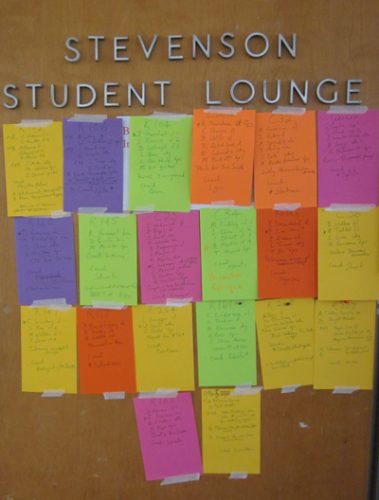
My ensemble assignment for the first week reflected much of BPI’s culture. After Sunday-evening, five-minute placement appointments, the faculty meets on Monday morning each week in a semi-secretive horse-trading session that results in the formation of some 20 groups that will meet for coachings every afternoon and perform on a marathon Saturday afternoon concert.
My group involved two singers, an oboist, and a cellist who would work up arias by Georg Philipp Telemann and Christoph Graupner under the tutelage of lutenist Lucas Harris. It’s the institute’s policy to leave the participants to their own devices for the first session, with coachings to begin on Tuesday.
The first run-through—I was playing organ continuo—went smoothly enough, but two of my colleagues who had done this before assured me that what seemed in good shape on Monday would be taken to pieces by the middle of the week and hopefully reassembled in time for Saturday afternoon’s student concert.
As coachings went on, I had some engaging conversations with my fellow ensemble members, some of whom brought a bit more experience to the institute than others but, taken together, reflected the wide age range of BPI participants from teens to 70-somethings. Luka Stefanović, the cellist, was 17 at the time but already had an impressive track record on the modern cello (his father plays violin in the Baltimore Symphony, and Luka is now in his third year at Oberlin). Florence Peacock, the soprano (from Chapel Hill, NC), has attended BPI for many years and managed to overcome auditory problems with the help of high-tech hearing aids—she’s amazing. Sue
Jones recalled that Florence arrived with a trunk full of fancy concert gowns, and Nick Jones penned a poem in her honor.
Bob Brooks, the bass, served for several decades in the Air Force, after which he took up church choir conducting and private voice teaching in Dallas. He had attended BPI for 13 years at that point, as had his wife Patsy, who was singing Telemann in another ensemble. (Bob had mined the archives and made his own edition of an obscure Graupner recitative and aria for Saturday’s concert.) Peter Maddigan, our Australian oboist, graduated from university with a double degree in modern and baroque oboe but gave those instruments up on the advice of his dentist when he began experiencing severe jaw pain. He went on to take a law degree and became a barrister. Ten years later, a new dentist advised him to have his wisdom teeth extracted, which immediately took care of the problem. He was returning for his second summer at BPI Oberlin.
Harris was a gentle but demanding coach who wasn’t afraid to try different interpretive approaches to the music as the week went on. Figured-bass guru Joe Gascho, who taught a brilliant continuo class every evening that attracted a range of keyboard players and an amazing collection of bass instruments, stopped by to hand out little pearls of advice.
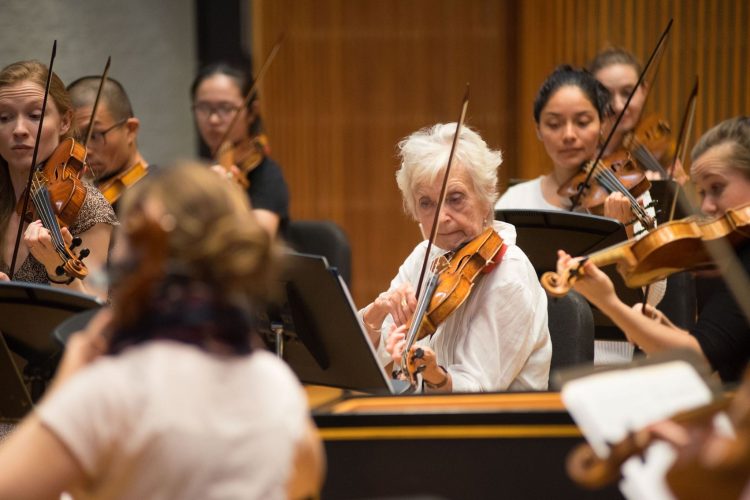
In the course of the week, we had the opportunity to see other coaches in action, like violinist Marilyn McDonald, who could listen to a problematic passage and have it fixed in just a few seconds. Again, coaches met players where they were and sensitively took them to the next level. Similarly, morning harpsichord master classes with Lisa Crawford, Mitzi Myerson, Mark Edwards, and Skip Sempe respected the individual attainments of students, challenging the accomplished, encouraging the neophytes, and providing takeaways both for those who were temporarily in the hot seat and for onlookers.
Much of the advice was immediately applicable, but some of us are still contemplating what Sempe had in mind when he referred to certain passages as “suspicious music.”
Slowik noted that passing along BPI’s culture is an ongoing process. “Over the years, as the early-music field has become increasingly professionalized, this is something we’ve striven to keep in place, even when institutions like the Oregon Bach Academy, the American Bach Soloists, or Tafelmusik are really exclusively aimed at the upper end of things. Oberlin has always been an undergraduate
institution preparing people for the next step. Many of us see a corollary to BPI—a program serving a lot of people for whom this is an introduction.”
Slowik acknowledged that the message of inclusion doesn’t always come across. “We get a new person on the faculty now and again, and we have to ‘teach them the BPI way,’ as Cathy Meints Caldwell put it. That’s the idea that the program is very supportive and not cutthroat at all. There’s always some Young Turk or two trying to make their mark.”
Taking to the internet during the Covid-19 pandemic reduced Oberlin BPI’s duration to one week last summer. Amherst Early Music, which holds events year-round, kept something approaching a normal schedule when they pivoted to online activities in March 2020.
“People liked it, so we kept repeating it and inventing as we went along,” executive director Boneau said. “Going online provided us with opportunities for mixed levels that we probably would not have had in person. Some are more content-heavy than we would have in a normal performance class—like Bruce Dickey talking about imitating the human voice. Going both deeper and wider, that topic works for all levels. “And we broadcast a medieval improvisation class with Norbert Rodenkirchen of Sequentia that attracted a whole range of people, from medieval music geeks and fans to professional players. There’s so little information that he could teach it on a fairly high level, but everyone was able to get something from it.”
Boneau noted that Amherst has found it more difficult to connect online with university-age students, who may just be more Zoomed-out than others. “Otherwise, we have reached people we wouldn’t have reached before, and we’re streaming concerts that we wouldn’t have before.”
Oberlin BPI has now been on furlough for two summers, due to the radical rearrangement of the college’s schedule during the pandemic to depopulate the campus and give every student a single room.
“We had to go virtual, which we decided we’d do for one week rather than two,” Slowik said. “Those of us who had a lot of experience with BPI thought that it was a pale shadow of itself. We couldn’t have any ensemble playing, which has always been part of the process for the students. Everything was on Zoom and sounded terrible. But surprisingly, people who had been there in person before and came back for the online version were quite understanding. And people who were there for the first time thought it was great, including a number of people from Europe and the Mideast who would not otherwise have been able to come.” Slowik, whose musical activities at the Smithsonian Institution and the Library of Congress continue to be on hold, is hoping BPI will be back in person in 2022.
“Fingers crossed,” he said. “And we’re toying with the idea of running a one-week, concurrent online session, if there’s enough interest.”
Daniel Hathaway founded ClevelandClassical.com after three decades as music director at Cleveland’s Trinity Cathedral. He studied historical musicology at Harvard College and Princeton University, and orchestral conducting at Tanglewood, and team-teaches Music Criticism at the Oberlin Conservatory of Music.

